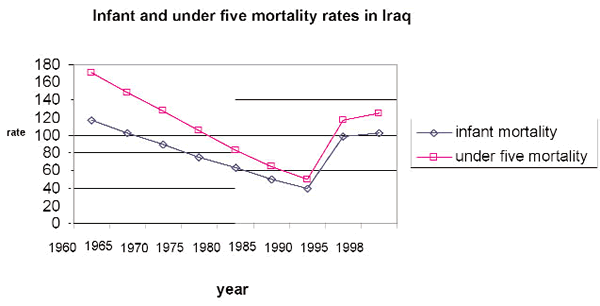APPENDIX E
Health in Iraq
The series of events beginning with the Iran-Iraq war through the Persian Gulf War and the period of trade sanctions all had major effects on the health of Iraqis. During this period, several health assessments were carried out, all pointing to deteriorating health status among Iraqis. Many of these surveys concentrated on measurement of child health. As children are the most vulnerable members of a community, child health is a sensitive indicator of a community’s overall health status. Surveys conducted between January and August 1991, estimated that more than 46,900 children died as a consequence of war and sanctions, a three-fold increase from the period prior to the war.22 Estimates in 1995 suggested that the effects of sanctions had increased the death toll among children.23 Evident in the graph below, the UN Oil-for-Food program introduced in 1996 helped improve conditions considerably, but this program had many difficulties.24
On the eve of the 2003 Iraq war, the country’s social fabric and its infrastructure had not recovered from the 1991 Gulf War, and the country was ill prepared to face new hardships. Food insecurity was still widespread. More than 40% of the population was dependent on government rations and public food supplies, and 15.4% of the population lacked adequate food.25 In a 2003 survey by the World Food program, 17% of children were found to be underweight and 32% chronically malnourished or stunted.26 Although children between one and five are particularly prone to these challenges, death due to malnutrition alone is rare. Malnutrition contributes to death from other conditions such as diarrhea, pneumonia and infections such as malaria or typhoid. Nutrition-related mortality is typically concentrated in children in their first year, which includes less than 5% of the Iraqi population. Because of this demographic pattern, food insecurity has relatively little effect on overall crude mortality compared with violent deaths, which affect all age groups.
Environmental hazards from chemical, biologic, and radioactive pollution during prior conflicts also pose a health risk. Oil spills and oil well fires during the Gulf war caused air pollution, soil contamination, heavy bombing, and vehicular movement caused further degradation of the environment.Water and sewerage capacity was never fully restored after the Gulf war bombing.
Of particular concern is the cluster of cancers and genetic defects now being reported from Basra. There has been some suggestion that this is associated with depleted uranium (DU) usage in anti-tank weapons by the US Army during the 1991 war. It has subsequently contaminated the ground water in Basra, on which 40% of Basra’s population depends on for drinking water.27
Figure 8. Infant (under 1 year) and child mortality (under 5 years) rates (per 1,000/year) for Iraq. These declined steadily from the 1960s to reach quite low levels (USA=11) in 1990. The subsequent wars and sanctions have wiped out 20 years of progress in child health.28
The Iraqi health care system was once the finest in the region, but has been in decline for several decades. At this time, it is no longer able to fully meet the health needs of its population. Fragmented services, poor standards of care, and inefficient referral systems are all in part due to pre-existing corruption, neglect, and shortages that arose during Saddam Hussein’s rule and from sanctions. The medical system was also crippled by intellectual embargos that prevented import of medical textbooks or journals into the country during the 1990s. Lack of regulation and management placed a strain on the already dwindling health care resources.
Compounding this issue are frequent health leadership changes in a system that finds it hard to conduct the long-term planning needed to restore health services.Weak supporting structures such as health information systems, finance management and human resource management in health, coupled with a weak government makes it hard for over-extended leadership to act decisively.
The 2003 Iraq War resulted in further destruction of vital infrastructures for food, water, security, and sanitation. As the health system further deteriorates, doctors and other health care workers are leaving Iraq. It was recently estimated that of the 34,000 doctors present in 2003, 12,000 have now emigrated and 2,000 have been murdered.29, 30 Much of the health care now being provided in Iraq comes from the unregulated private sector. The coalition’s efforts to rebuild health facilities have largely faltered.
